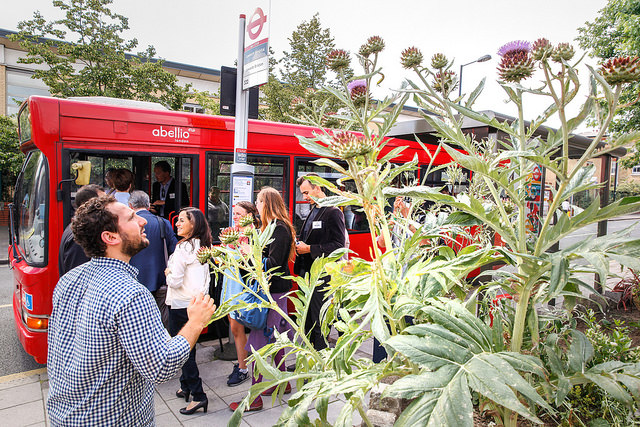
Citymart expands to U.S. to make procurement more open, agile and resilient
An image from Citymart’s London Leaders Study Tour on Sustainable Development. Photo by Citymart on Flickr.
Knight Foundation supports Citymart’s U.S. launch to help Knight communities experience a new approach to public procurement. Below, Sascha Haselmayer, founder and CEO of Citymart, writes about the benefits of a more open approach to the procurement process. RELATED LINKS
“Citymart to help city governments tackle local problems through innovation challenges with $398,000 from Knight Foundation,” press release, 01/14/15
Take a moment and visit your city’s website. Look up the section on “Problems we plan to solve” or “Submit your proposals here if your solution can deliver a better service at lower cost.”
You didn’t find it? Don’t worry; it likely doesn’t exist, and that is just how it works almost everywhere today. That’s a missed opportunity.
For several years we’ve been working with cities around the world about how to change that, and new support from Knight Foundation will help broaden this work in the United States.
If you search your city’s website, what you probably will find are policy announcements or a strategic plan for your community. You may even find the page where your city publishes requests for proposals, or RFPs, which are the public contracts companies can bid for.
Dig further into one of those RFPs, and you will find dozens, if not hundreds of pages of specifications, terms and conditions, and legal clauses. You will belong to the chosen few if you can make out what it is your community wants to buy. You will also notice that if you have a better solution than what is asked for, it is too late. Since the city didn’t publish the problem earlier, there was no way for you to educate them about your offering.
Welcome to the world of public procurement. Professionals use adjectives such as “rigid,” “confrontational,” “abstract” and “risk-averse” to describe it. That’s a shame because public procurement by local governments constitute the world’s single largest budget to improve communities – estimated at $1 trillion annually just in the U.S.
All this matters, because the quality of life in our communities (especially those most vulnerable) is greatly affected by the quality of services. Yet, according to our research, local governments will on average know just 3 percent of the available solutions to solve a problem. Instead of rapidly sharing the best solutions, our communities spend billions every year reinventing solutions, when they could be delivering the best possible services. Solutions that might arise in months instead take years, if they are discovered at all.
When we started Citymart in 2011, most experts recognized the problem but concurred that without wide-ranging policy and legal framework changes the way public procurement works couldn’t be altered. But we thought that the problem was not with the laws or regulations, but with our assumptions about how these should be applied.
Our hypothesis was simple: Could we replace the hundreds of pages of detailed specifications in RFPs with a precise problem statement, explaining the desired result? Fast-forward four years, and more than 50 global cities have done just that with remarkable results.
Barcelona, where a traditional $1.5 million procurement attracts interest by 20 vendors, offers a great example. In a recent $1.5 million RFP published with Citymart, 55,000 citizens and entrepreneurs took up the challenge to deliver solutions to combat bicycle theft. The RFP created a level playing field for global vendors and local social entrepreneurs alike to win public contracts – without increasing risks for the administration.
Citymart helps cities identify and frame community needs into problem statements and create user-friendly processes that make procurement accessible to the widest base of vendors possible. Working with so many cities helps us rapidly share improvements among all. To get the best results, we actively engage vendors, communities, organizations and experts to source the best solutions. And best of all, this generates an unrivaled open knowledge resource for all to share, use and contribute.
Through our #citiesshare alliance, partner cities are working on a joint target of opening at least 1 percent of their annual procurement through our methodology.
In the U.S., several cities have already embarked on bold efforts to reform procurement. We are excited to launch Citymart in the U.S. to help more cities and communities experience a new approach to procurement and unlock this incredible resource.
Recent Content
-
Community Impactarticle ·
-
Community Impactarticle ·
-
Community Impactarticle ·


